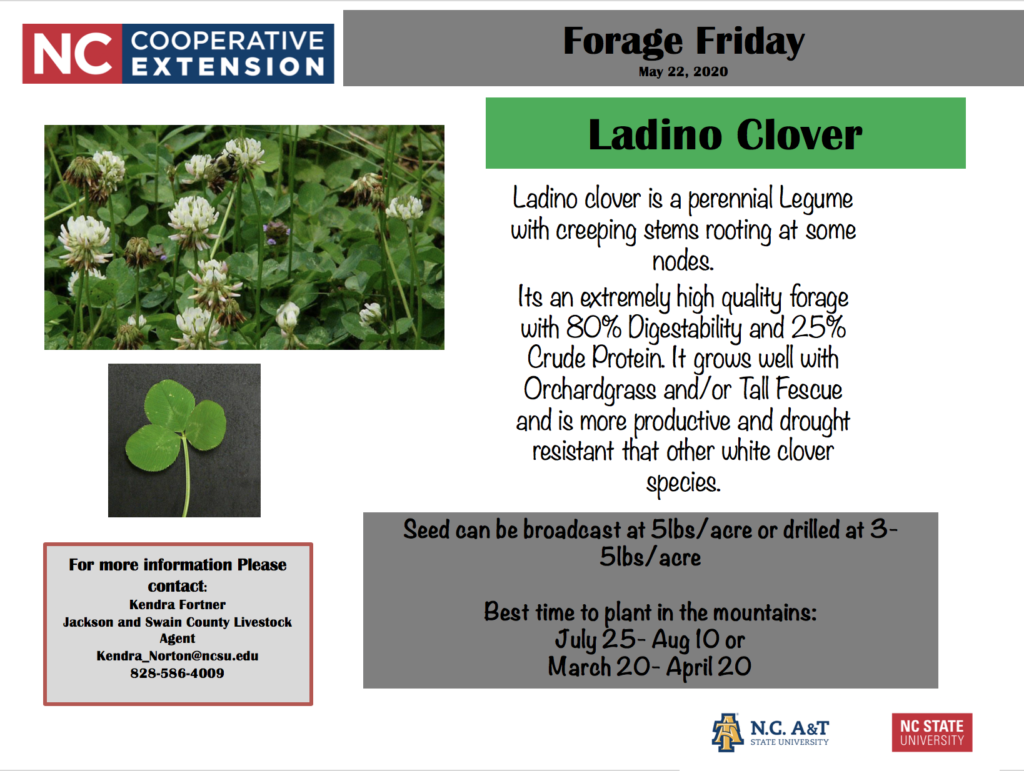Forage Friday: Ladino Clover – May 22, 2020
go.ncsu.edu/readext?694190
en Español / em Português
El inglés es el idioma de control de esta página. En la medida en que haya algún conflicto entre la traducción al inglés y la traducción, el inglés prevalece.
Al hacer clic en el enlace de traducción se activa un servicio de traducción gratuito para convertir la página al español. Al igual que con cualquier traducción por Internet, la conversión no es sensible al contexto y puede que no traduzca el texto en su significado original. NC State Extension no garantiza la exactitud del texto traducido. Por favor, tenga en cuenta que algunas aplicaciones y/o servicios pueden no funcionar como se espera cuando se traducen.
Português
Inglês é o idioma de controle desta página. Na medida que haja algum conflito entre o texto original em Inglês e a tradução, o Inglês prevalece.
Ao clicar no link de tradução, um serviço gratuito de tradução será ativado para converter a página para o Português. Como em qualquer tradução pela internet, a conversão não é sensivel ao contexto e pode não ocorrer a tradução para o significado orginal. O serviço de Extensão da Carolina do Norte (NC State Extension) não garante a exatidão do texto traduzido. Por favor, observe que algumas funções ou serviços podem não funcionar como esperado após a tradução.
English
English is the controlling language of this page. To the extent there is any conflict between the English text and the translation, English controls.
Clicking on the translation link activates a free translation service to convert the page to Spanish. As with any Internet translation, the conversion is not context-sensitive and may not translate the text to its original meaning. NC State Extension does not guarantee the accuracy of the translated text. Please note that some applications and/or services may not function as expected when translated.
Collapse ▲Join our Livestock Agent, Kendra Fortner, on Fridays for Forage Friday. We will be covering quick tips on forage options in the mountains of North Carolina.”
This week’s featured forage: Ladino Clover
Ladino clover is a perennial Legume with creeping stems rooting at some nodes.
It’s an extremely high quality forage with 80% Digestibility and 25% Crude Protein. It grows well with Orchardgrass and/or Tall Fescue and is more productive and drought resistant than other white clover species.
- Seed can be broadcast at 4 pounds per acre or drilled at 3-5 pounds per acre.
- Best time to plant in the mountains: July 25 – August 10 or March 20 – April 20.
- Planting Guide for Forage Crops in North Carolina: provides the best available information about planting rates, depths and stand evaluation for forage crops commonly grown in North Carolina.
For more information, contact:
Kendra Fortner
Jackson and Swain County Livestock Agent
Kendra_Norton@ncsu.edu
(828) 586-4009





